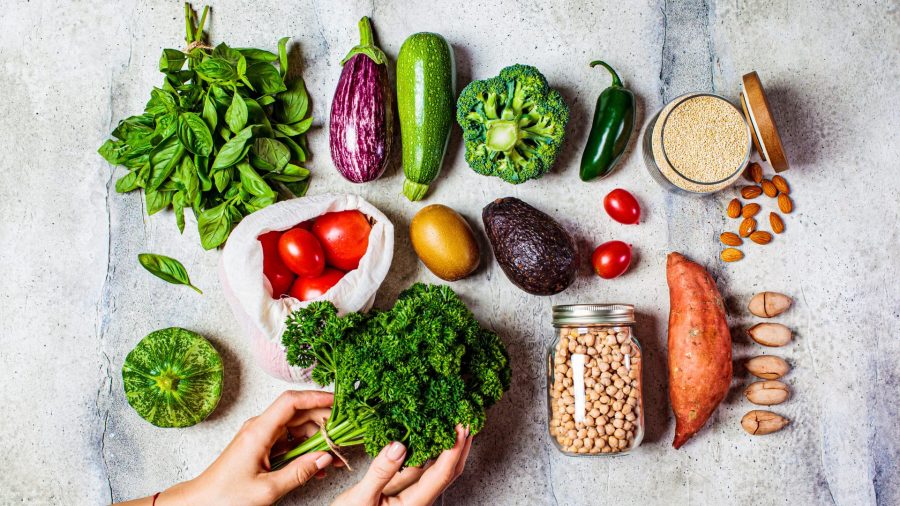The Science Behind Why BBQ Sauces Make Plant-Based Dishes Irresistible
The Science Behind Why BBQ Sauces Make Plant-Based Dishes Irresistible
Blog Article
Everything About Healthy Food: Benefits of Taking On Plant Based Alternatives
The discussion surrounding plant-based diets has gained considerable focus recently. Many individuals are exploring the potential wellness benefits, nutritional advantages, and environmental impacts associated with these dietary choices. As people end up being a lot more mindful of their food's impact on health and sustainability, inquiries develop about the usefulness of embracing such a way of life. What particular adjustments can one anticipate, and exactly how might these options reshape not only personal health but likewise the world's future?
Understanding Plant-Based Diets
Although numerous individuals link plant-based diet regimens mostly with vegetarianism or veganism, these diets can incorporate a wide variety of eating patterns that focus on entire, minimally processed plant foods. Such diets typically consist of fruits, vegetables, whole grains, seeds, beans, and nuts, while eliminating or limiting animal items. This flexibility allows individuals to customize their dietary choices according to personal choices and nutritional requirements. Some may adopt a mainly plant-based diet plan while still periodically consuming meat or dairy products, frequently referred to as a flexitarian strategy. The focus stays on including even more plant foods, which can result in a varied range of dishes and flavors. Understanding these various interpretations of plant-based consuming is vital for appreciating its accessibility and allure in modern food culture.
Health And Wellness Perks of Plant-Based Foods
The wellness benefits of plant-based foods are substantial, providing a nutrient density benefit that supports overall well-being. Research shows that these foods can improve heart wellness and play an important function in efficient weight administration. By integrating a lot more plant-based choices, individuals might improve their dietary choices and advertise long-lasting health.
Nutrient Thickness Advantage
Nutrient thickness plays a necessary role in the health and wellness benefits of plant-based foods, making them a compelling option for those seeking a well balanced diet regimen. Plant-based foods, such as fruits, veggies, vegetables, nuts, and entire grains, are commonly abundant in important vitamins, minerals, and anti-oxidants while being lower in calories. This high nutrient thickness allows people to eat less calories while still fulfilling their nutritional requirements. Furthermore, these foods are packed with nutritional fiber, promoting gastrointestinal wellness and aiding in weight monitoring. By integrating nutrient-dense plant-based alternatives, customers can improve their overall wellness, support their immune systems, and decrease the danger of persistent conditions. Ultimately, the nutrient density of plant-based foods emphasizes their relevance in a health-conscious lifestyle.
Heart Health Renovation

Weight Monitoring Assistance
In enhancement to promoting heart wellness, a plant-based diet can significantly help in weight management. This dietary approach stresses entire foods such as fruits, veggies, beans, nuts, and entire grains, which are normally lower in calories and greater in fiber contrasted to animal-based items. The high fiber web content assists enhance satiety, lowering overall calorie intake. Furthermore, plant-based diet plans are commonly rich in essential nutrients while reduced in undesirable fats, making it easier to maintain a healthy weight. Gluten Free BBQ Sauce. Research shows that people who adopt a plant-based way of life often tend to have reduced body mass indexes (BMIs) and experience more effective weight management compared to those who eat meat-heavy diet regimens. Subsequently, accepting plant-based choices is a tactical selection for efficient weight monitoring
Nutritional Value of Plant-Based Ingredients
Plant-based active ingredients are rich in important nutrients, offering a diverse selection of vitamins, minerals, and anti-oxidants that add to total health. A comparison of protein resources reveals that while pet products are commonly considered as premium, several plant-based choices provide adequate healthy protein and other beneficial substances. Comprehending the dietary worth of these components can assist individuals make notified dietary choices.
Essential Nutrients in Plants
Nutrient-rich components found in plants use a varied range of vital vitamins and minerals that contribute substantially to total health and wellness. These components are abundant in vitamins A, C, and K, which support immune function, vision, and blood clotting, specifically. Additionally, plants provide crucial minerals such as potassium, magnesium, and calcium, vital for heart wellness, muscle mass function, and bone stamina. The visibility of fiber in plant-based foods aids food digestion and advertises a healthy digestive tract microbiome. Anti-oxidants, discovered perfectly in vegetables and fruits, help battle oxidative stress and reduce inflammation. Lots of plant foods are reduced in calories yet high in nutrients, making them a superb selection for those seeking to keep a healthy weight while making sure perfect nutrient intake.

Contrasting Protein Resources
Protein sources differ substantially in their nutritional accounts, with plant-based ingredients providing distinct benefits. Unlike animal healthy proteins, which frequently contain hydrogenated fats and cholesterol, plant proteins have visit homepage a tendency to be lower in these harmful components. Legumes, nuts, seeds, and entire grains are abundant in crucial amino acids, fiber, navigate to this website vitamins, and minerals. Lentils supply high protein web content along with considerable iron and folate, while quinoa is a full protein, supplying all 9 essential amino acids. Furthermore, plant-based proteins are often gone along with by antioxidants and phytochemicals that support total wellness. The shift to plant-based healthy protein resources not just boosts dietary consumption however likewise straightens with sustainable dietary practices, decreasing environmental impact and promoting long-term health and wellness benefits.
Ecological Impact of Plant-Based Eating
As awareness of climate adjustment expands, several people are discovering sustainable nutritional choices that can significantly minimize their environmental footprint. Plant-based consuming has arised as a substantial factor to lowering greenhouse gas discharges, which are mainly related to animals production. The cultivation of fruits, beans, grains, and vegetables generally needs fewer resources, such as water and land, compared to animal farming. In addition, plant-based diets can lead to decreased deforestation, as much less land is required for grazing livestock or expanding animal feed. By moving towards plant-based alternatives, consumers can support biodiversity and advertise much healthier environments. On the whole, accepting plant-based eating not only advantages individual health yet also represents an important step toward environmental sustainability and conservation efforts.
Overcoming Common Misconceptions
While several people recognize the advantages of a plant-based diet plan, numerous misconceptions typically deter them from totally embracing this way of living. A common idea is that plant-based diets do not have enough healthy protein; nevertheless, numerous plant sources, such as vegetables, nuts, and tofu, offer adequate healthy protein. Additionally, some assume that this diet is pricey, when in truth, staples like beans, rice, and seasonal veggies can be quite affordable. One more misunderstanding is that plant-based eating is overly restrictive, whereas it really offers a varied array of foods and tastes. Numerous fret that a plant-based diet might lead to shortages, yet with correct planning, individuals can get all necessary nutrients, consisting of minerals and vitamins, while taking pleasure in a broad range of delicious dishes.
Tips for Transitioning to a Plant-Based Way of living
Making the change to a plant-based lifestyle can be an enhancing experience, though it frequently needs some advice to navigate the preliminary adjustments. People are encouraged to begin gradually, incorporating more fruits, vegetables, vegetables, and entire grains right into their meals while reducing meat and milk usage. Meal planning is essential; preparing a regular menu can help reduce the modification and prevent last-minute unhealthy options. Discovering cooking methods and brand-new recipes can likewise maintain and improve the experience enjoyment regarding plant-based consuming. Additionally, signing up with support system or areas can offer inspiration and share important pointers. Staying notified about nourishment warranties balanced dishes, protecting against shortages while fostering a healthy, satisfying plant-based way of life.

Delicious Plant-Based Meal Concepts
Exploring scrumptious plant-based meal ideas can inspire individuals to welcome a more healthy diet. One popular option Get the facts is a hearty quinoa salad, featuring cherry tomatoes, cucumber, and a vibrant lemon-tahini dressing. An additional favorite is a tasty lentil stew, packed with carrots, celery, and aromatic herbs, ideal for a soothing supper. For breakfast, over night oats made with almond milk, chia seeds, and covered with fresh berries provide a healthy start to the day. Furthermore, a vibrant veggie stir-fry with tofu and a range of vibrant veggies can be a fast yet pleasing meal. Lastly, creamy avocado salute on whole-grain bread, sprinkled with spices and seeds, uses a straightforward yet tasty treat. These dishes display the selection and splendor of plant-based eating.

Regularly Asked Inquiries
Can a Plant-Based Diet Supply Sufficient Healthy Protein?
The question of whether a plant-based diet regimen can provide sufficient protein prevails. Many resources, consisting of beans, nuts, seeds, and entire grains, can meet protein requires properly, supporting a nourishing and well balanced diet plan for individuals.
Are Plant-Based Diets Suitable for Kid?
The viability of plant-based diet regimens for youngsters depends on careful preparation. Adequate nutrients must be ensured, consisting of healthy proteins, minerals, and vitamins. With correct assistance, such diet plans can sustain healthy development and development in kids.
How Do I Eat in restaurants on a Plant-Based Diet regimen?
Eating in restaurants on a plant-based diet entails seeking restaurants with varied menus, requesting modifications, and discovering vegan-friendly options. Preparation ahead and interacting nutritional preferences can boost the dining experience while keeping dietary selections.
What Are Common Irritants in Plant-Based Foods?
Usual allergens in plant-based foods include soy, gluten, nuts, and seeds - Plant Based Beef. People adhering to a plant-based diet ought to recognize these irritants and read tags carefully to prevent damaging responses and ensure safe consumption
Can Plant-Based Diets Assist With Weight Loss?
Research indicates that adopting a plant-based diet may help with weight loss due to its commonly lower calorie density and higher fiber web content. This mix can enhance satiety, helping individuals manage their calorie consumption efficiently. Lots of individuals connect plant-based diet plans primarily with vegetarianism or veganism, these diets can incorporate a wide array of consuming patterns that focus on whole, minimally processed plant foods. Nutrient thickness plays an essential duty in the wellness benefits of plant-based foods, making them an engaging selection for those looking for a balanced diet regimen. Plant-based diet plans have been revealed to considerably enhance heart wellness, as they typically have elements that sustain cardiovascular feature. In enhancement to advertising heart health and wellness, a plant-based diet regimen can considerably aid in weight management. A common idea is that plant-based diet plans lack enough protein; nonetheless, many plant sources, such as beans, nuts, and tofu, offer ample protein.
Report this page